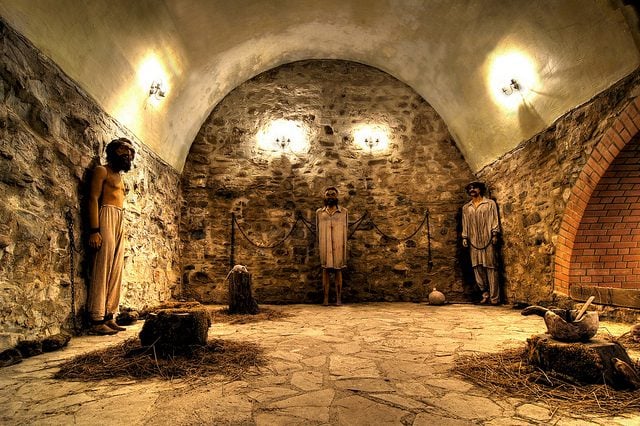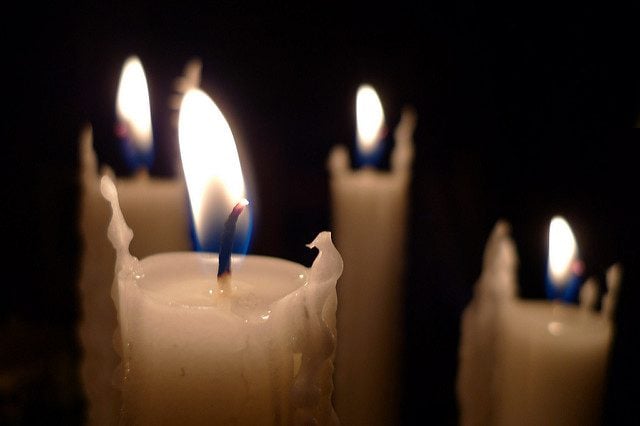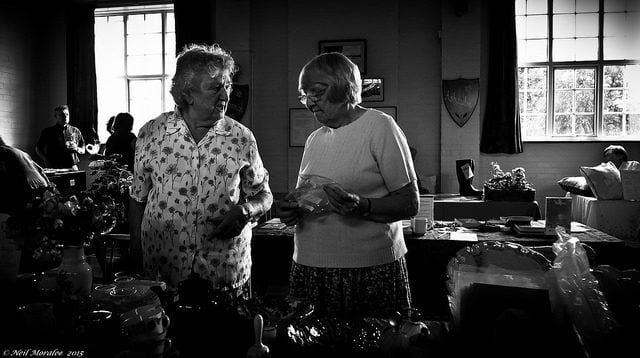The Nativity of Our Lord Jesus Christ
Isaiah 9:2-7 – Psalm 96 – Titus 2:11-14 – Luke 2:1-20
A light shined brightly in the middle of the dark, frozen night.
From somewhere deep in the muddy, cold trenches of World War I, candles began appearing one by one atop the parapets, where just a few hours earlier riflemen had been firing bullets across the battlefield.
And in a land of deep darkness, on them, a light began to shine.
And it was a deep darkness. Friends and brothers-in-arms lay dead or dying, covered in fresh frost. French, German, and English soldiers huddled in trenches, fighting one of the most brutal wars in modern history.
It was 1914, just a few months into what would become a four year war of trench warfare, chemical attacks, and genocide. It was a war that would claim the lives of 8 million soldiers and countless more civilians who died in the conflict and the resulting disease and famine. The major nations involved lost between 10 and 15 percent of their male populations.
And yet. And yet, as Isaiah reminds us tonight, even in a land of deep darkness, light can still shine.
On the parapets of the trenches, against all expectations and against all hope, on Christmas Eve in 1914, candlelight and makeshift Christmas trees began to shine, and there was peace on earth where there should have been war; there was goodwill among men, where there should have been bloodshed.
And then, daring to hope, the Germans, after placing up these lights atop the trenches, began to sing. They sang “Silent Night,” their voices piercing the darkness and echoing across a land that, until that moment, had been deafened by war and explosions, grief and violence, death and cold despair.
A thrill of hope, a weary world rejoices.
Soldiers from France and England and Scotland responded with carols of their own. In a moment of inexplicable grace, instead of volleying fragmentation shells, grenades and rifle fire across the battlefield, they instead began to volley the Good News that on this night Christ was born.
At last, the soldiers on all sides began to sing as one. They sang “O Come All Ye Faithful.” And come they did. They left their trenches. They left their weapons. They left their war. And they walked into No Man’s Land, unarmed. They walked past shrapnel and barbed wire. They walked among their war dead.
Enemies met on the battlefield that Christmas Eve and proclaimed — if only for a moment — the Birth of Christ, just as the angels once had, by bringing glad tidings of great joy for all people, the good news of peace on earth, goodwill toward men.
In the black of night and the darkness of war, matches were struck so enemies could light one another’s cigarettes. They came together on the battlefield, homesick and dreaming of home. They came together to exchange gifts instead of bullets. They came together to gather their dead, soldiers they themselves had killed, so they could hold a burial service that night and mourn, together.
They came together to share their common humanity. And in doing so, they did something divine. They became images themselves of the Incarnation, where humanity and divinity become one.
What these men did on this now famous Christmas Truce of World War I was nothing short of treasonous. They didn’t follow their orders to wage war. Instead, they waged peace. They did not follow their orders to shoot their enemies. Instead, they offered comfort and aid to them. And they did so in the holy name of Christ.
It seems preposterous, doesn’t it? For decades, people dismissed this story as nothing more than a latrine rumor. They even did their best to debunk it. It so defied their expectations that it was easier to pretend it never happened than to hope it might happen again.
But it did happened. And I still marvel at it, how it turns our expectations completely upside-down. Not in our wildest dreams could we imagine tough, grizzled soldiers who had blown each other up for months on end disarming of their weapons, their safety, and their power. Not in our most outlandish fairy tales could we imagine warriors entering a battlefield so completely vulnerable, so utterly powerless, so voluntarily weak.
In their own way, these soldiers were re-enacting the first Christmas story, the story of the Incarnation. The omnipotent and almighty enters the battlefield of earth as a helpless newborn without even the strength to hold his own head up. The Creator, who brought forth fruit and life from the ground, becomes a part of the earth, an infant who must depend on inexperienced and impoverished parents to feed him, keep him warm, and to teach him about love and life on this planet.*
In the birth of Christ, God disarms completely. It is a risky, insane thing to do, to trust a people with such a horrible track record of violence and war. But trust us God does anyway. It’s a lot like the risk those soldiers took that Christmas Eve night in 1914. Imagine what it must have been like, to gamble your life on the humanity of your enemy. It was a risky gamble to leave their weapons and the war and cast their lot with their enemies. It was a risky gamble to trust that they could find the Christ child born in their enemies on a hushed, frozen battlefield.
Because that is exactly what God does in the Incarnation. It is God’s incredulous, risky gamble, when God bets on us. Christmas is God pushing all the chips on the table without even looking at the cards in his hand and saying, “No matter what I’m holding, No matter what you’re holding on to. No matter what cards are left in the deck. No matter who’s hiding aces up their sleeves. No matter what, I’m all here. I’m all in. I’m with you.”
That is the story of Christmas. That no matter what God is with us. Emmanuel.
So we come here tonight out of the trenches of our own lives, having walked in our own darknesses, hoping for light, the light of Christ. We make it here, after the shopping, after the baking, after the hosting. We make it here even if we still have a to-do list waiting on us to finish before dawn breaks.
We come here for an hour or two, even if we really don’t have that kind of time to spare, because we know, deep down, that this story means something, and that Christmas isn’t really Christmas until we share and tell this story here, together.
We come here to be reminded of this great, improbable, and upside-down story, that God is indeed with us, our great light in the overwhelming darkness.
We are reminded that he didn’t come in the halls of the wealthy and powerful.
Or in the canons and chemical warfare of World War I.
God came to us as a baby, vulnerable and powerless, through the hard midnight labors of an unmarried teenager.
In peace proclaimed through Christmas carols rather than in battle cries.
God came to us on a silent night, a night with the power to silence even the violence of the War to End All Wars.
He came to us with a thrill of hope, with a weary world rejoicing, for the coming of a tiny helpless child, for the breaking of a new and glorious morn.
On this holy night, when Christ is born.
______
* Thanks to my adopted Welsh cousin (and author) John Henson for the writing prompt on this section.
* If you haven’t seen the Joyeux Noel, a film about the ceasefire of 1914, do yourself a favor and rent it today.











